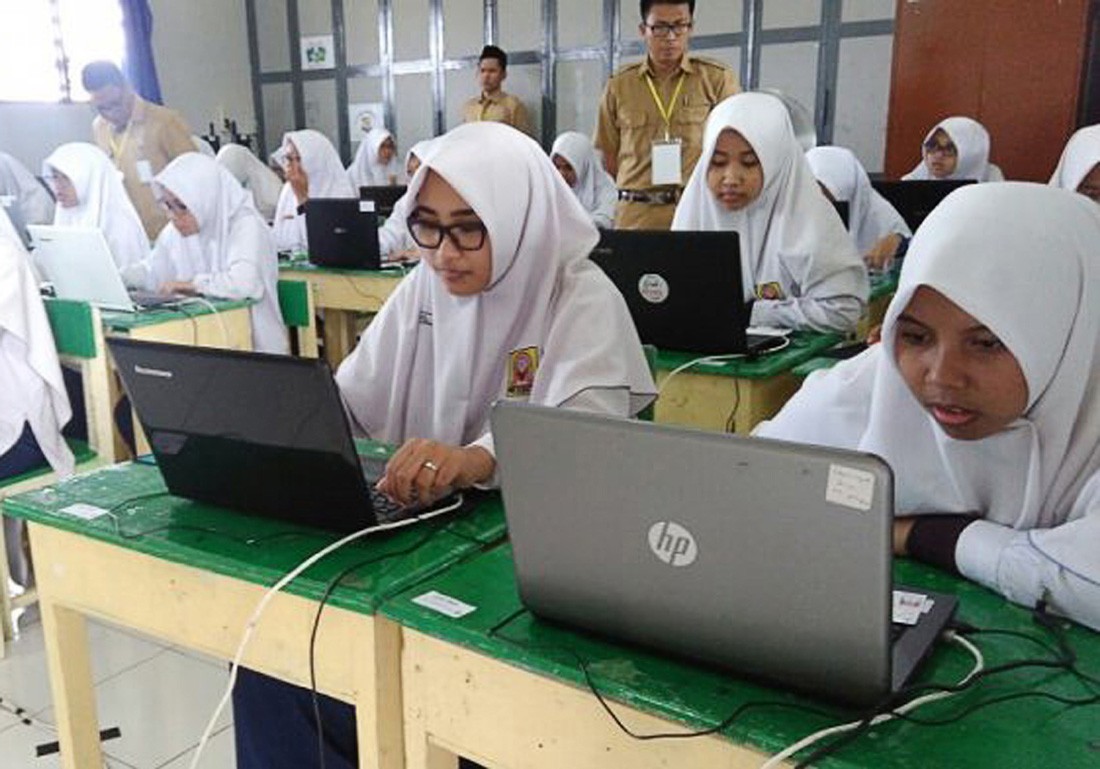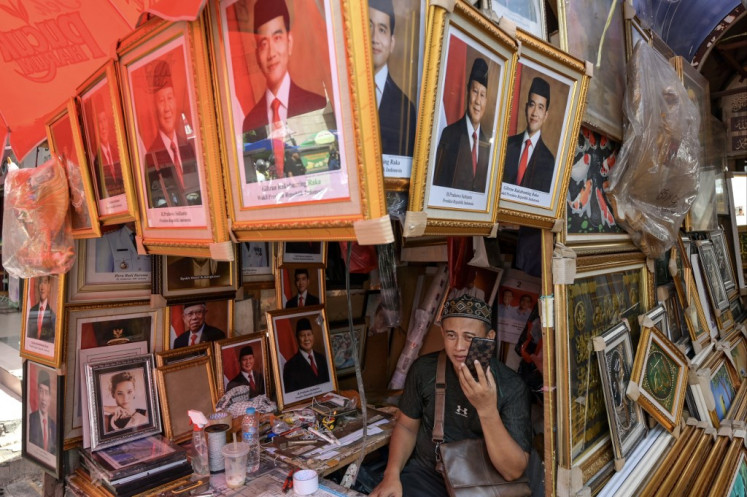Hijab: Avoided subject on Children's Day
Administrators and teachers quickly add that they merely “advise” students on what they should wear.
Change Size
 Tough task: Students of a junior high school in Surakarta, Central Java, attend the computer-based national exam on April 24. (JP/Ganug Nugroho Adi)
Tough task: Students of a junior high school in Surakarta, Central Java, attend the computer-based national exam on April 24. (JP/Ganug Nugroho Adi)
T
he most visible way of celebrating National Children’s Day, which falls on July 23, has been through ceremonies after ceremonies.
And then? That’s it — until the same is repeated next year.
We will once again deliberately avoid discussing or even mentioning some sensitive but crucial and very real problems faced by our children, and how to find solution to the problems.
Therefore, I would like to discuss one real problem faced by our children: how teachers, parents and the government impose uniformity and forced conformity on children in many of the country’s state schools in the name of a certain interpretation of religious teachings, without considering the feeling and opinions of the children themselves.
By allowing this, coupled by a growing penetration of a fundamentalist interpretation of Islam, state schools have been suppressing creative thinking and creativity. They have become a breeding ground for intolerance and exclusivism, and even leading to fanaticism, possibly creating a generation of young people who resort to violence just to make a point and maintain their exclusivism.
This is true even after reports emerged that the head of a family of suicide bombers had received his extreme religious instructions in extracurricular classes of his state high school in Surabaya, East Java.
While such extremist ideas taught in extracurricular religious classes became prevalent in state high schools in the late 1980s, the recent penetration of fundamentalism has become even stronger, occurring right before the eyes of parents, teachers and the government.
Just take a look at the virtually forced use of hijab for female students in numerous state schools, from elementary to high schools. The hijab is not part of the school uniform, but the sea of covered heads at state schools suggests otherwise.
In fact, when asked by parents if it is part of the school uniform, the school managements will say it is not. But then, the administrators and teachers quickly add that they merely “advise” students on what they should wear.
But for parents and students, such “advice” from a school is like an order that is even stronger than a government regulation.
The distribution of uniforms occurred just last week at the start of the new academic year. As usual, the schools “advise” female Muslims students to wear their uniform with a hijab. How could new students and parents resist such “advice” from teachers as the school representatives? What would happen to our daughters if they ignored such advice? Would she become the only Muslim girl without her head covered? What would her teachers say? What would her friends say?
Uncovered girls in state schools from diverse areas, even nonMuslims, have reported about being bullied by friends and questioned by teachers.
The use of hijab in state schools has become a fundamental yet sensitive issue we have avoided for so long. While the schools hide under the word of “advice”, parents choose to comply and tell themselves the hijab is a noble thing, a good way to teach Islam and to protect their children by dressing them modestly. Or if they really can’t accept it, they can move their children to a private school with barely a whimper.
Meanwhile, the Education and Culture Ministry and local governments have stayed silent because it is too politically damaging to even touch on the issue while unwittingly encouraging the practice.
I support people wearing the hijab if it is what they want. But conditioning our children to be exclusive, by virtually singling out females who resist teachers’ preferences for “good” clothes, exposes them to the example that suppressing freedom of choice is good and being different is bad during their formative years.
It is about creating generation after generation of youths who won’t respect creativity, freedom of expression and being different.
What can we expect from our children growing up in this environment? We should protect our children from the suppression of creativity and the ideology of intolerance and exclusivism by freeing state schools from this hidden systemic suppression of freedom.
The government must make the bold move of ordering schools to allow students and parents to choose not to wear the hijab. School must discard hidden and psychological situations leading to hijab enforcement.
This is not a suggestion to ban the hijab in schools. In fact, this is a suggestion that students must be fully supported to wear a hijab in schools if they and their parents wish so.
But this is also a strong suggestion that students and parents, from elementary to high school, must be fully supported if they choose not to wear the hijab.
But dealing with mere clothing won’t be enough.
Overhauling the material covered in religion classes is also crucial. The subject should aim at forming good character, morals and integrity and how to forge good relations with others, regardless of their faith — not merely discussing heaven and hell or memorizing prayers.
The careful curating of books to be used in schools is also vital, particularly in the face of studies revealing extreme content in textbooks that potentially condone violence.
But such fundamental revisions will require educating teachers to become open-minded. This is the toughest job and a long-term project, but it is essential as teachers are at the center of all school reforms.
Last but not least is the introduction of more liberal arts in schools. Reading literary works should be mandatory for all students and must be included in the curriculum, while critical discussions should be a way of life for students.
Let’s encourage our children to dare question, dare to disagree and dare to be different.
As issue after issue piles up in our daily reality, we don’t talk anymore about the follow-up of crucial problems like the Surabaya church bombing just over two months ago. We have no more space, memory or energy to further discuss children being used by their parents as bombers to murder others.
As the incident faded away from our memory, we neither seem to have the interest in finding out how President Joko “Jokowi” Widodo’s order to fight “radicalism” and terrorism in schools has been implemented. We largely respond to anything that is viral.
Let’s hope that the President doesn’t forget his own instruction, because as he is now busy seeking reelection, he doesn’t want to discuss such sensitive issue any longer.
***
The writer is a novelist and visiting fellow at the National University of Singapore.










